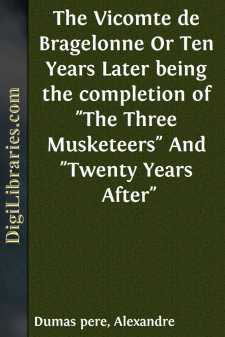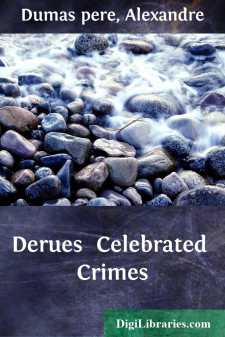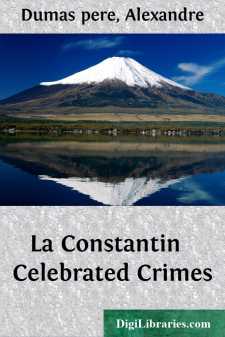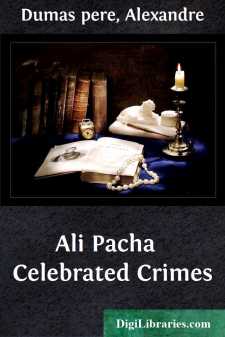Categories
- Antiques & Collectibles 13
- Architecture 36
- Art 48
- Bibles 22
- Biography & Autobiography 813
- Body, Mind & Spirit 142
- Business & Economics 28
- Children's Books 17
- Children's Fiction 14
- Computers 4
- Cooking 94
- Crafts & Hobbies 4
- Drama 346
- Education 46
- Family & Relationships 57
- Fiction 11829
- Games 19
- Gardening 17
- Health & Fitness 34
- History 1377
- House & Home 1
- Humor 147
- Juvenile Fiction 1873
- Juvenile Nonfiction 202
- Language Arts & Disciplines 88
- Law 16
- Literary Collections 686
- Literary Criticism 179
- Mathematics 13
- Medical 41
- Music 40
- Nature 179
- Non-Classifiable 1768
- Performing Arts 7
- Periodicals 1453
- Philosophy 64
- Photography 2
- Poetry 896
- Political Science 203
- Psychology 42
- Reference 154
- Religion 513
- Science 126
- Self-Help 84
- Social Science 81
- Sports & Recreation 34
- Study Aids 3
- Technology & Engineering 59
- Transportation 23
- Travel 463
- True Crime 29
Alexandre Dumas pere
Alexandre Dumas was a prolific French writer best known for his historical adventure novels, including "The Three Musketeers" and "The Count of Monte Cristo." Born in 1802, he was the son of Thomas-Alexandre Dumas, a mixed-race general in Revolutionary France. Dumas's works are celebrated for their fast-paced narratives, vivid characters, and intricate plots, making him one of the most widely read French authors in the world.
Author's Books:
Sort by:
CHAPTER I. THE PORTE ST. ANTOINE. On the 26th of October, 1585, the barriers of the Porte St. Antoine were, contrary to custom, still closed at half-past ten in the morning. A quarter of an hour after, a guard of twenty Swiss, the favorite troops of Henri III., then king, passed through these barriers, which were again closed behind them. Once through, they arranged themselves along the hedges, which,...
more...
CHAPTER I. SHOWING WHAT NEITHER THE NAIAD NOR DRYAD HAD ANTICIPATED. Saint-Aignan stopped at the foot of the staircase which led to the entresol, where the maids of honor were lodged, and to the first floor, where Madame's apartments were situated. Then, by means of one of the servants who was passing, he sent to apprise Malicorne, who was still with Monsieur. After having waited ten minutes,...
more...
AN OLD NOBLEMAN AND AN OLD MAÎTRE-D'HÔTEL. It was the beginning of April, 1784, between twelve and one o'clock. Our old acquaintance, the Marshal de Richelieu, having with his own hands colored his eyebrows with a perfumed dye, pushed away the mirror which was held to him by his valet, the successor of his faithful Raffè and shaking his head in the manner peculiar to himself, "Ah!"...
more...
MONSIEUR DE GUISE'S LATIN. On Monday, the 18th of August, 1572, there was a splendid festival at the Louvre. The ordinarily gloomy windows of the ancient royal residence were brilliantly lighted, and the squares and streets adjacent, usually so solitary after Saint Germain l'Auxerrois had struck the hour of nine, were crowded with people, although it was past midnight. The vast, threatening,...
more...
INTRODUCTION The contents of these volumes of 'Celebrated Crimes', as well as the motives which led to their inception, are unique. They are a series of stories based upon historical records, from the pen of Alexandre Dumas, pere, when he was not "the elder," nor yet the author of D'Artagnan or Monte Cristo, but was a rising young dramatist and a lion in the literary set and...
more...
About the end of the year 1639, a troop of horsemen arrived, towards midday, in a little village at the northern extremity of the province of Auvergne, from the direction of Paris. The country folk assembled at the noise, and found it to proceed from the provost of the mounted police and his men. The heat was excessive, the horses were bathed in sweat, the horsemen covered with dust, and the party...
more...
One September afternoon in 1751, towards half-past five, about a score of small boys, chattering, pushing, and tumbling over one another like a covey of partridges, issued from one of the religious schools of Chartres. The joy of the little troop just escaped from a long and wearisome captivity was doubly great: a slight accident to one of the teachers had caused the class to be dismissed half an hour...
more...
CHAPTER I Before beginning our story, we must warn the reader that it will not be worth his while to make researches among contemporary or other records as to the personage whose name it bears. For in truth neither Marie Leroux, widow of Jacques Constantin, nor her accomplice, Claude Perregaud, was of sufficient importance to find a place on any list of great criminals, although it is certain that they...
more...
CHAPTER I The beginning of the nineteenth century was a time of audacious enterprises and strange vicissitudes of fortune. Whilst Western Europe in turn submitted and struggled against a sub-lieutenant who made himself an emperor, who at his pleasure made kings and destroyed kingdoms, the ancient eastern part of the Continent, like mummies which preserve but the semblance of life, was gradually...
more...
Should you ever go to Rome and visit the villa Pamphili, no doubt, after having sought under its tall pines and along its canals the shade and freshness so rare in the capital of the Christian world, you will descend towards the Janiculum Hill by a charming road, in the middle of which you will find the Pauline fountain. Having passed this monument, and having lingered a moment on the terrace of the...
more...











